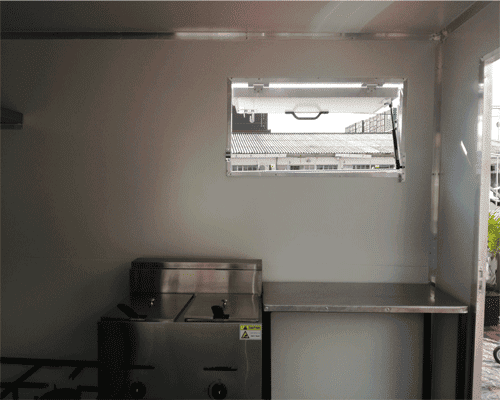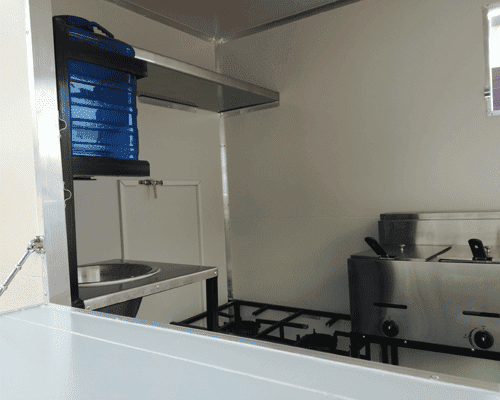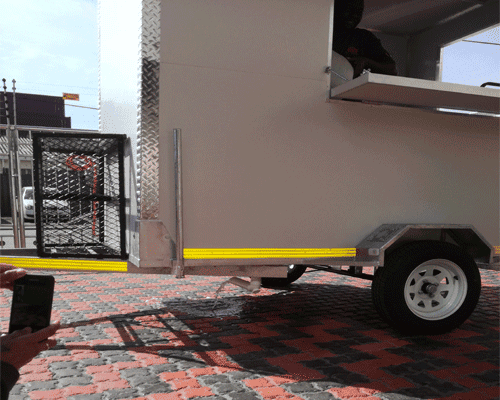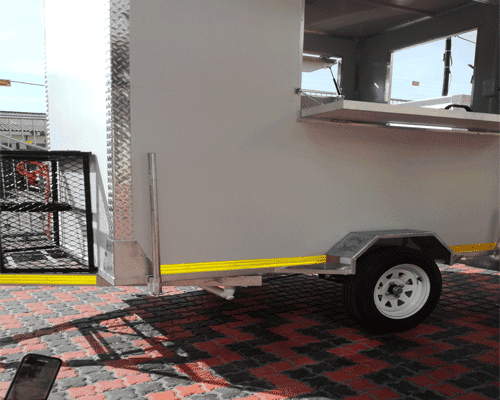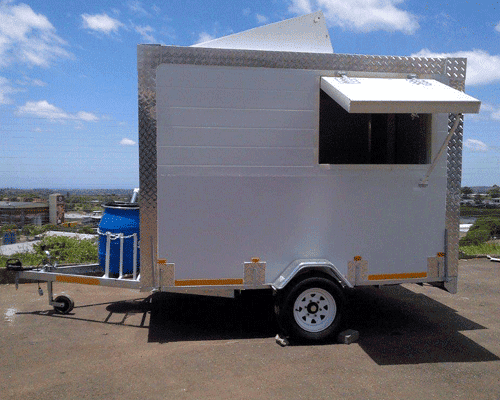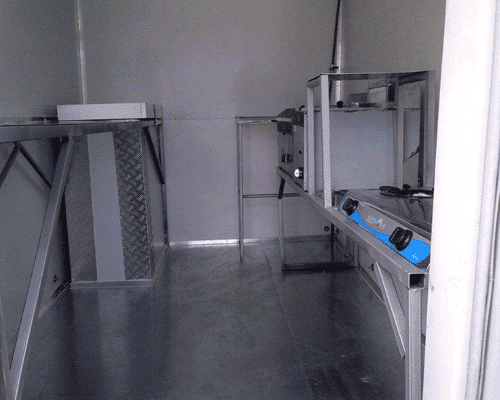Mobile Kitchen Trailer: A Complete Portable Solution for Food Service
A Mobile Kitchen Trailer is a fully equipped, mobile food preparation unit designed for serving food in various locations, offering flexibility, convenience, and efficiency for food service providers. These trailers are used in catering, festivals, outdoor events, food trucks, and emergency relief situations, providing a professional kitchen setup that can be transported to different locations.
Features of a Mobile Kitchen Trailer
- Fully Equipped Kitchen
- Mobile kitchen trailers are designed to house a complete kitchen setup, including cooking equipment, refrigeration, storage, and food preparation areas, all within a compact space.
- Common equipment includes ovens, stovetops, grills, fryers, refrigerators, freezers, sinks, and workstations, making it easy to prepare and serve food anywhere.
- Customizable Layout
- These trailers are customizable to suit the specific needs of the food service operation. Whether you’re serving a small menu or preparing large quantities of food, the trailer layout can be tailored to maximize space and efficiency.
- Features such as counters, shelving, storage compartments, and a cooking station are designed to optimize workflow.
- Mobility
- The key benefit of a mobile kitchen trailer is its mobility. It can be easily towed to different locations by a vehicle, allowing food service operators to reach various events, festivals, or customer locations.
- Ideal for events like food festivals, weddings, corporate gatherings, and outdoor markets.
- Temperature Control
- Mobile kitchen trailers come with built-in cooling systems (like refrigerators and freezers) and sometimes even heating systems, ensuring that food is stored and cooked at safe and optimal temperatures.
- This is especially important for the transportation of perishable ingredients and ready-to-serve meals.
- Compliance with Health and Safety Regulations
- These trailers are designed to meet local health and safety regulations, including proper ventilation, fire safety standards, and waste disposal systems.
- Many trailers come equipped with handwashing sinks, grease traps, and fire extinguishers to ensure compliance with food safety standards.
- Durability and Weather Resistance
- Mobile kitchen trailers are built with robust materials designed to withstand outdoor environments. They are weather-resistant, insulated to maintain temperature, and often come with heavy-duty tires for easy transport.
- Power Supply
- Mobile kitchens are powered by generators or external power connections, ensuring that cooking and refrigeration equipment can function even in remote or off-grid locations.
- Many trailers are equipped with electrical systems to handle the entire kitchen setup, including lighting, ventilation, and cooking equipment.
Benefits of a Mobile Kitchen Trailer
- Flexibility
- Mobile kitchen trailers allow food service providers to offer their services in different locations, reaching a broader audience and catering to diverse events. This flexibility is especially beneficial for catering businesses, food trucks, or pop-up restaurants.
- Cost-Effective
- Renting or owning a mobile kitchen trailer can be a cost-effective way to set up a food service business without investing in a permanent location. It eliminates the need for expensive restaurant space and overhead costs.
- Convenience
- Whether it’s for festivals, outdoor events, or catering services, mobile kitchen trailers offer a convenient and portable kitchen solution that eliminates the need to transport ingredients to different locations or rent kitchen space.
- Branding Opportunities
- With custom wraps and designs, mobile kitchen trailers offer a unique branding opportunity for businesses, allowing them to stand out in crowded events or festivals.
- Time-Saving
- Having all kitchen equipment in one place and within close proximity allows for faster food preparation and service, helping food vendors meet high-demand situations with minimal delays.
- Scalability
- Mobile kitchen trailers can be scaled to fit different types of events and menus. Whether you’re preparing a small, simple menu or cooking large quantities of food for a large event, the trailer setup can be adjusted to accommodate the scale.
Applications of Mobile Kitchen Trailers
- Food Truck and Street Food
- Food trucks and street food vendors use mobile kitchen trailers to serve customers on the go. These trailers enable food vendors to bring their signature dishes to local street markets, festivals, and events.
- Catering and Weddings
- Mobile kitchen trailers are a great option for catering services at weddings, corporate events, and private parties, providing an efficient space for food preparation and service on-site.
- Corporate Events and Festivals
- Catering for large gatherings such as corporate events, concerts, and festivals requires significant kitchen space. Mobile kitchen trailers provide the necessary tools to prepare and serve food at scale.
- Disaster Relief and Emergency Situations
- In disaster relief scenarios or emergency situations, mobile kitchen trailers can be deployed to provide meals for large groups of people. These trailers are self-sufficient and can be set up quickly to deliver food aid in crisis situations.
- Pop-up Restaurants
- Mobile kitchen trailers are ideal for pop-up restaurants or temporary food establishments. They allow chefs to bring their culinary skills to various locations, offering customers unique dining experiences.
Choosing the Right Mobile Kitchen Trailer
When selecting a mobile kitchen trailer for your business, consider the following factors:
- Size and Capacity
- Determine the size of the trailer based on your food service needs. Larger trailers offer more space for equipment and food preparation, but smaller trailers may be better for mobile food trucks or smaller events.
- Equipment Needs
- Make sure the trailer is equipped with all the necessary appliances and tools for your menu. Common equipment includes grills, fryers, ovens, refrigeration units, sinks, and storage areas.
- Power Source
- Choose a trailer that fits your power needs. Depending on your location, you may need a generator, battery power, or the ability to plug into external power sources.
- Layout and Design
- Consider the layout of the trailer. The design should maximize the use of space, making food preparation, cooking, and serving as efficient as possible.
- Health and Safety Compliance
- Ensure that the mobile kitchen trailer complies with local health and safety regulations. It should have necessary features like fire suppression systems, proper ventilation, and sanitary equipment (e.g., handwashing stations).
FAQs
Q1. What is included in a mobile kitchen trailer?
A mobile kitchen trailer typically includes cooking equipment (grills, fryers, ovens), refrigeration units (fridges and freezers), sinks, storage for dry goods and ingredients, and work surfaces for food preparation. Customizations may also include food holding areas and customer-facing counters.
Q2. How much does a mobile kitchen trailer cost?
The cost of a mobile kitchen trailer can vary widely depending on the size, customization, and equipment included. On average, they range from $30,000 to $150,000 or more. Renting is also an option for short-term needs, which can cost between $500 to $2,000 per day.
Q3. Can a mobile kitchen trailer be used for events of any size?
Yes, mobile kitchen trailers are versatile and can be used for events of all sizes, from small gatherings to large festivals or corporate events. The trailer size and equipment should be chosen based on the expected crowd and type of food service required.
Q4. How is the mobile kitchen trailer powered?
Mobile kitchen trailers are typically powered by built-in generators, external power sources (such as electrical outlets at event locations), or a combination of both.
Q5. How do I maintain a mobile kitchen trailer?
Regular maintenance is crucial to ensure the mobile kitchen operates efficiently. This includes cleaning the kitchen, checking cooking equipment, ensuring refrigeration is functioning, and inspecting plumbing and electrical systems.

